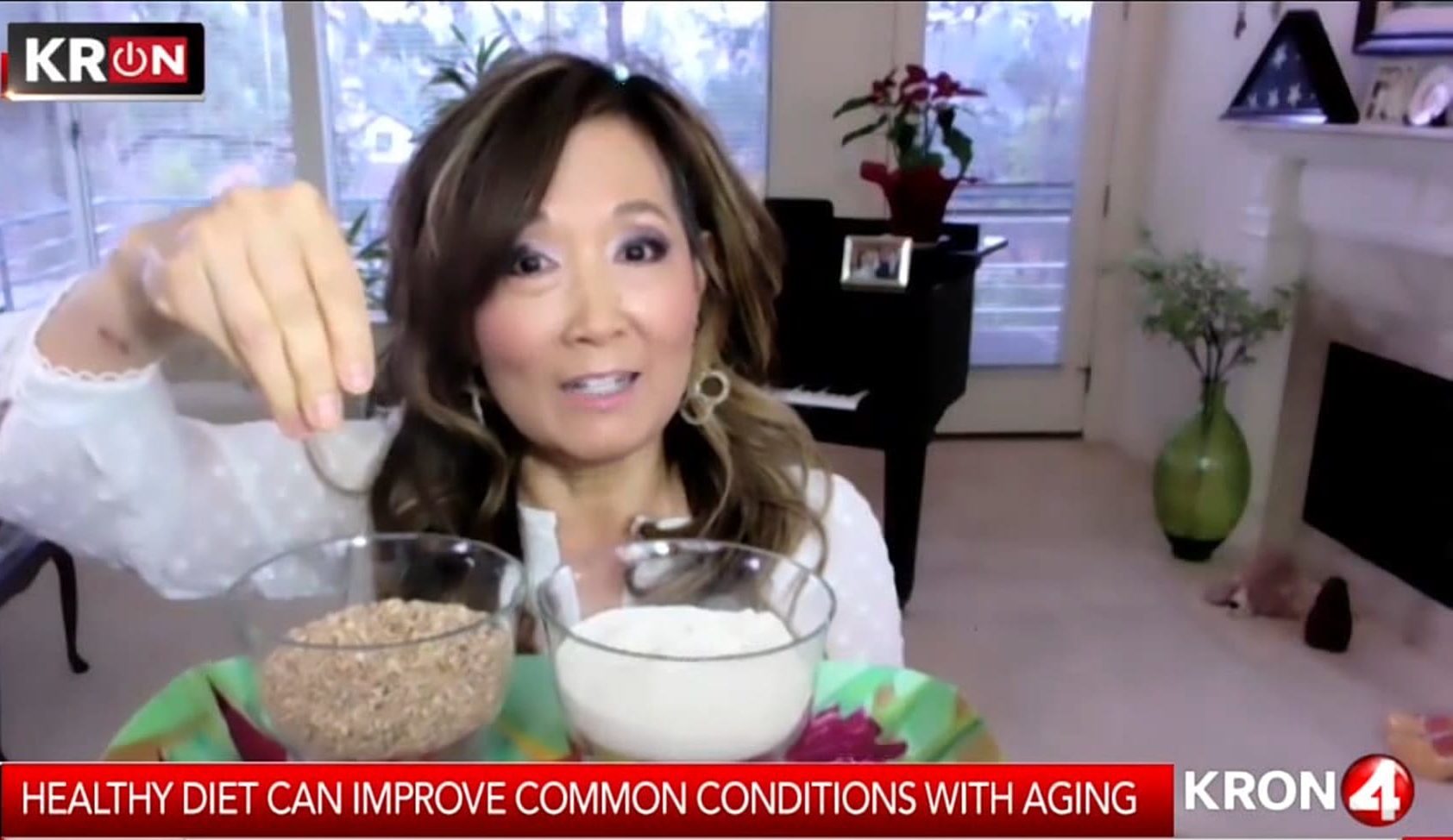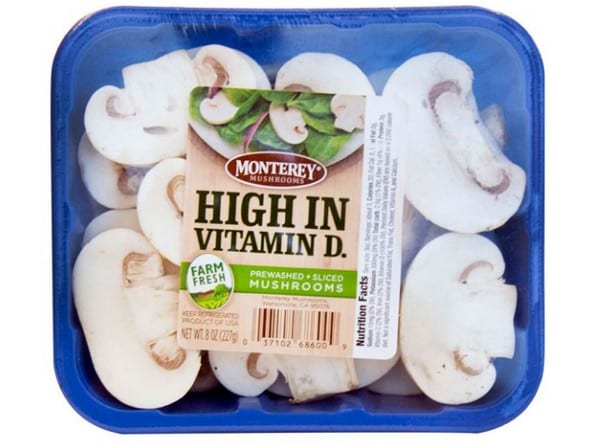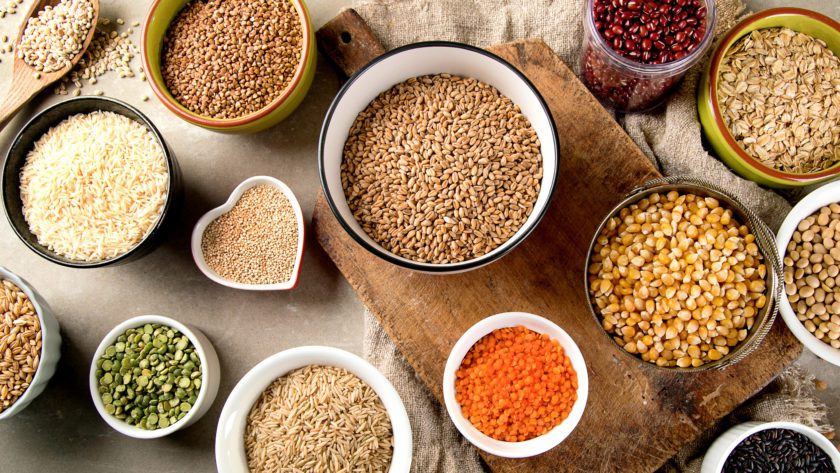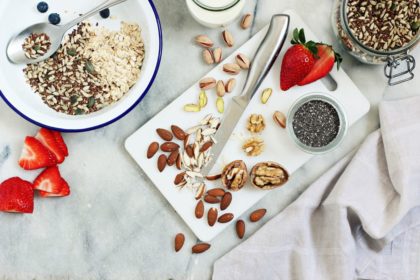There are several surprising ways that food can improve your health and actually remedy conditions common with aging. Last week on KRON 4 News I talked about how the foods you eat can affect your hearing and balance. In Part 2, here are more more healthy, anti-aging food fixes. See Food Fixes That Slow Aging (Part 1).
3. Joint Pain
Food fix: Eat more fiber-rich foods.
Fiber is a carbohydrate found in plant foods: beans, fruit, grains, nuts, and vegetables. If fiber can reduce inflammation, it stands to reason that it may help reduce the risk of arthritis. A recent study of 4,796 participants, published in the Annals of the Rheumatic Diseases evaluated two groups of people and found the following:
- Group 1: Eating 20 grams of fiber per day had a 30% lower risk of knee osteoarthritis than those who ate about 8 grams.
- Group 2: Eating 25 grams of fiber per day had a 61% lower risk than those who consumed about 14 grams. Here’s what 25 grams looks like:
- Steel-cut oats, 1/4 cup = 4 grams
- Apple, 3” medium with skin = 4.4 grams
- Black beans, 1/2 cup = 6 grams
- Pistachios, 1 oz = 3 grams
- Raspberries, 1 cup = 8 grams
4. Depression
The Fix: Replace refined carbs with whole grains, and increase vitamin D intake.
Depression is more than feeling down or sad, studies show it may also physically change your brain — that is, parts of the brain SHRINK in people who suffer from depression. Experts aren’t sure what causes these brain changes, but suspect genetics, inflammation, and stress. Brain volume loss seems to be higher in people who have regular or ongoing depression with serious symptoms.
Studies show depression affects the hippocampus and pre-frontal cortex. When the hippocampus (learning and memory) and pre-frontal cortex (higher-level thinking and planning) are impaired, symptoms include:
- Memory loss
- Trouble thinking clearly
- Guilt or hopelessness
- No motivation
- Sleep or appetite problems
- Anxiety
Comfort vs Discomfort Foods When depressed, people often turn to their “comfort foods” to soothe their emotions. The Problem: Most comfort foods consist of refined carbohydrates, sugar, and fat. Eating simple, refined carbs, give you a quick boost of energy for about 20 or 30 minutes, but that rise turns into a steep dive. Spikes and dips in energy can cause your mood to crash too.
Whole Grains Whole grains, such as brown, red, or black rice, farro, oats, and quinoa (where the grain is “intact” and you can actually see the grain), release energy gradually over the course of 3 to 4 hours. White rice is not an intact whole grain because it is no longer intact from having been stripped of its outer bran layer.

Vitamin D Vitamin D may also be helpful for boosting your mood. Older adults may be prone to a deficiency, in part because the ability to produce D from sunlight declines with age.
A 2018 of almost 4,000 adults (age 50+) found that those with vitamin D deficiency — defined in this study as blood levels lower than 30 nmol/L (nanomoles per liter) — were more likely to develop depression. Consume more fatty fish (salmon, mackerel, anchovies, sardines, herring), mushrooms*, fortified milk and breakfast cereals.
 Mushrooms can produce vitamin D when exposed to UV light. Some commercial mushrooms are treated with UV light. Mushrooms grown in the dark contain very little D.
Mushrooms can produce vitamin D when exposed to UV light. Some commercial mushrooms are treated with UV light. Mushrooms grown in the dark contain very little D.
To summarize our two segments, here are the food fixes for conditions common with aging:
- Hearing loss — High quality plant-based foods
- Poor balance — Protein
- Joint pain — Fiber-rich foods
- Depression — Whole grains, vitamin D-rich foods

![]() Karen’s Fit Tip: Eat well to age well. A plant-centered lifestyle is beneficial to preventing disease as well as resisting the negative effects of aging. Focus on eating whole foods (minimally processed) and following the “healthy plate” style of eating to keep meals simple and balanced.
Karen’s Fit Tip: Eat well to age well. A plant-centered lifestyle is beneficial to preventing disease as well as resisting the negative effects of aging. Focus on eating whole foods (minimally processed) and following the “healthy plate” style of eating to keep meals simple and balanced.





